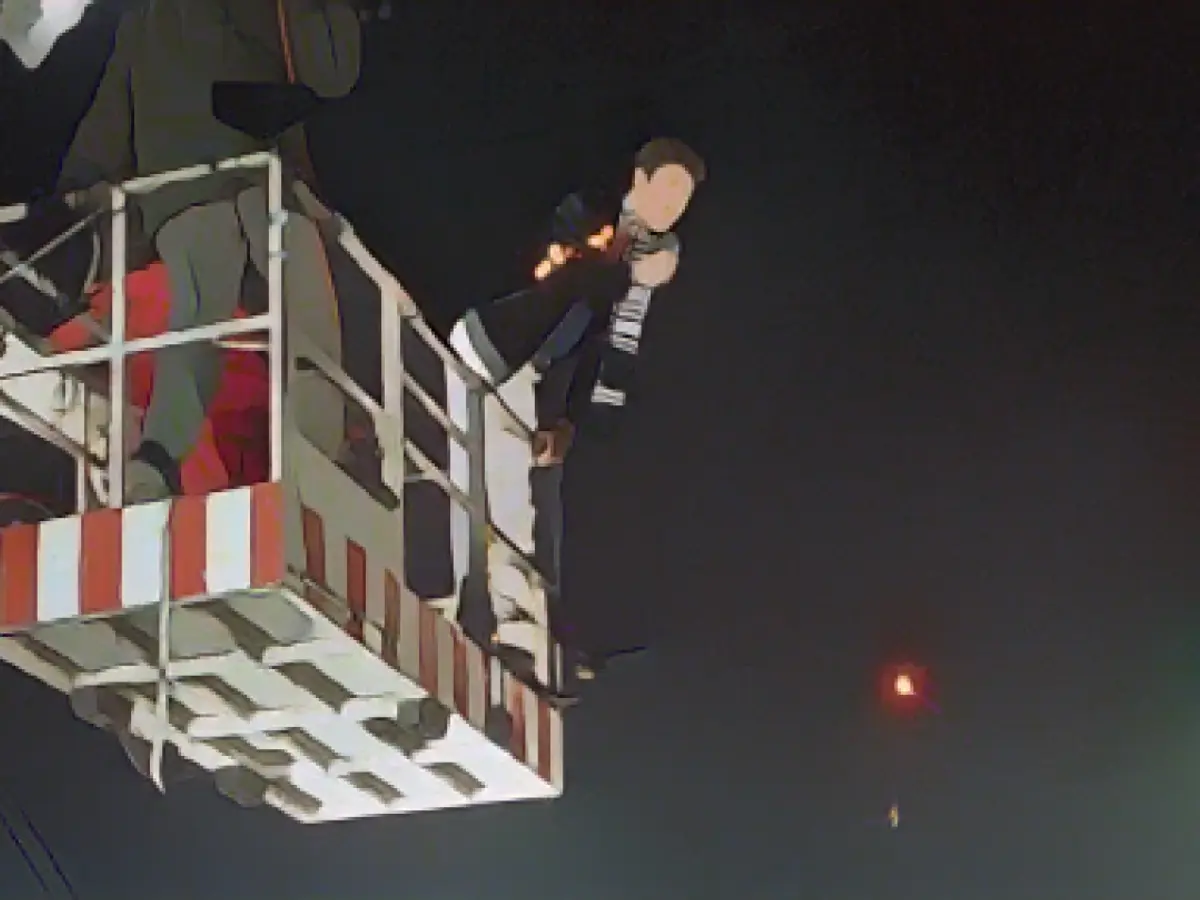Flashing leather jacket and piano scarf - David Hasselhoff reveals: How he got to his legendary New Year's Eve performance at the Berlin Wall
Although the wall is still largely standing, it is already gone. It has lost its horror. At the turn of the year 1989/1990, Germans were able to celebrate New Year's Eve together for the first time in decades. In the middle of it all (or rather on a lifting platform above it) back then: David Hasselhoff, the "Knight Rider". In a flashing leather jacket and with a piano scarf - right at the Brandenburg Gate, above the heads of hundreds of thousands of revelers - he sings his biggest hit.
"Looking for Freedom" is the best-selling single of the year in Germany in 1989 and finally becomes one of the anthems of unity thanks to its performance on New Year's Eve at the Berlin Wall.
David Hasselhoff reports on the New Year's Eve performance
The myth that Hasselhoff literally brought down the Wall with his song persists to this day - but is vehemently rejected by "The Hoff" time and again. "I am not responsible for the fall of the Wall, the East Germans are responsible for that because they believed in freedom," he clarified years later. He was just "in the right place at the right time", he once told "Playboy".
The story would have been too good to tell. However, the story that led to the legendary Berlin performance at the end of the reunification year is also worth hearing. In the portrait "Being David Hasselhoff" by filmmaker Oliver Schwabe, which was produced by Rundfunk Berlin-Brandenburg, the now 70-year-old"Baywatch" star spills the beans some 30 years later and talks about what it was like from his perspective at the end of 1989.
At the time, Hasselhoff was busy filming the "Lifeguards of Malibu" in California. Nobody could have guessed that the series would later become the most successful in the world.
"They sing over the Berlin Wall"
He only followed what was happening on the other side of the pond, in Berlin, in passing, only seeing the Wall from an airplane. At some point, Hasselhoff received a call from Germany.
"We would like you to sing with us on New Year's Eve."
"Where?"
"In a hotel. You're singing 'Looking for Freedom' and 'Flying on the Wings'."
"No. If I do, I want to sing on the wall. Better still: above the wall on a crane."
"Then we need permission from Helmut Kohl and Honecker."
"Okay, then get the permission."
After the conversation, someone asked him if he really believed that they would take care of it in Germany. "No, I don't think so," Hasselhoff replied. "But I'll do it one way or another."
The call back came later: "You're singing on a crane over the wall. On New Year's Eve." The rest is history: a flashing leather jacket, a piano scarf and "Looking for Freedom" from thousands of throats. A performance, broadcast live on ZDF, that is etched in the collective memory of Germans - and also in that of David Hasselhoff, who crowned the year of reunification with his hit.
"I sang in front of a million people for Germany's reunification, came back to L.A. and went to work the next morning," he recalls of his short trip to Europe. On the set of "Baywatch", a colleague asked how he had spent the turn of the year - still under the impression of the night, he replied. "I don't feel anything. I've just come from Berlin."
Berlin has been the city that Hasselhoff has been drawn to ever since. In 2013, he stood at the Wall again. At the East Side Gallery, the 1.3 kilometer long preserved section of the former border fortifications, he demonstrates with thousands of Berliners - this time for the preservation of the section of the Wall. But that's another story.
Editor's note: This article was first published at the turn of the year 2019/2020 and has been updated for republication.
Read also:
- Lifestyle 2023 from "Breathless" to cinnamon buns
- Unanimous decision: faster wolf culls possible
- New Year's Eve fireworks: What applies in other countries?
- Ban on New Year's Eve fireworks: no bangs here
The legendary New Year's Eve performance of "Looking for Freedom" by David Hasselhoff took place not in a hotel, as initially suggested, but above the Berlin Wall on a lifting platform. This performance, which was broadcast live on ZDF, became an anthem of unity for Germans and significantly contributed to the song's popularity, making it the best-selling single of 1989 in Germany.
Despite the misconception, Hasselhoff clarified that he was not responsible for the fall of the Berlin Wall, attributing the credit to the East Germans who believed in freedom. The "Knight Rider" star also mentioned that he was filming "Baywatch" in California at the time, unaware of the events unfolding in Berlin.
When Hasselhoff received a call inviting him to perform in Berlin, he insisted on singing above the Wall. Obtaining the necessary permissions from Helmut Kohl and Honecker was a challenge, but Hasselhoff remained determined to make it happen.
In the filmmaker Oliver Schwabe's portrait "Being David Hasselhoff", the star shared his memories of the historic event, recounting his short trip to Europe and its impact on him. This performance solidified Hasselhoff's connection to Berlin, which continues to this day, as evidenced by his return to the city in 2013 to demonstrate for the preservation of the East Side Gallery.
In reference to the original text, the performance at the Brandenburg Gate on New Year's Eve was a significant moment in German history, with Hasselhoff's flashing leather jacket and piano scarf becoming iconic symbols of the event.
Source: www.stern.de







